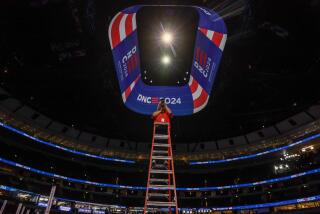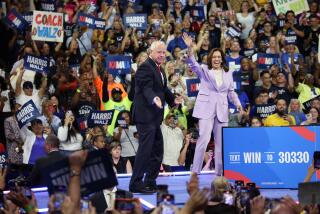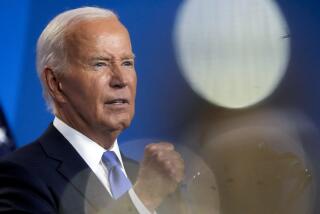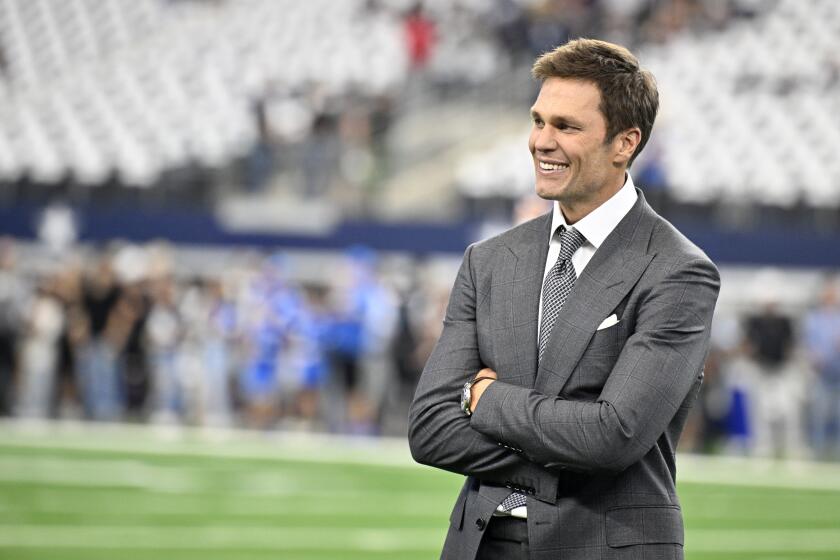Athletes-Agents Issue Is Not on the Agenda at NCAA Convention
NASHVILLE, Tenn. — The NCAA will use its annual convention to say goodby to the man who has led the organization for 36 years but will also find time to discuss football playoffs, bowl invitations, academic standards and scholarships.
More than 1,800 delegates representing about 650 schools will gather this week for the 82nd annual NCAA convention and its first since 1950 without Walter Byers as executive director.
Dick Schultz, who replaced the retired Byers Oct. 1, will do something his predecessor never did and deliver a “state of the NCAA” speech Sunday to kick off the five-day meeting.
Delegates will begin voting Tuesday on 163 agenda items and are scheduled to finish on Thursday. Major items include restoring five football scholarships that were taken away by vote of the 1986 convention, tightening academic requirements for athletes beyond their freshman year and deleting the rule that says schools cannot accept or be offered bowl bids until late November.
There is nothing on the agenda dealing with agents or athletes who sign with agents before their eligibility is up.
Byers, ironically, will be more visible at this convention than he ever was in 36 years as the organization’s head. Monday afternoon’s annual “honors luncheon,” will in effect become Walter Byers appreciation day. Several speakers will recount the colorful and frequently controversial reign of the reclusive Kansas City native and present him with gifts.
Byers will conclude the activities with a “swan song” address to the organization he shaped and guided through almost four decades. He has not been available for interview since relinquishing power to Schultz and becoming “executive director emeritus,” but many NCAA insiders expect him to go out with a few parting shots at old enemies.
“Walter’s speech might wind up being the most quotable address of the entire convention,” said one staff aide who asked not to be named.
Monday morning and afternoon will be taken up with the second leg of the national forum on college sports. Created last year by the NCAA Presidents Commission, the forum is designed to explore issues and problems leading up to the 1989 convention. This year’s session will focus on economic issues and speakers will include Georgetown basketball coach John Thompson; CBS Sports President Neal Pilson; Robert Atwell, president of the American Council on Education, and Thomas J. Frericks, vice-president at Dayton University and current NCAA secretary-treasurer.
Democratic presidential candidate Jesse Jackson will be among six former college athletes receiving the Silver Anniversary Award during Monday’s luncheon. Jackson will not speak.
One of the proposals voted upon Wednesday morning would do away with the rule that says schools cannot accept or be offered bowl bids prior to the Saturday after the third Tuesday in November. The bowls themselves requested the restriction, but it has become one of the most visibly violated rules in any sport.
“If the Fiesta Bowl wants to invite Notre Dame and Penn State on the Fourth of July, they’ll be free to do so,” said Chuck Neinas, executive director of the College Football Association. “There is a widespread feeling that the bowls themselves have created this situation and now they should begin policing themselves.”
The 63-member CFA has not lined up in support of a Big Eight-sponsored move to rescind the action by last year’s convention that cut from 30 to 25 the number of football grants a school can offer in one year.
“We were somewhat surprised that they are not supporting us, but we are going to be talking to those people before the vote,” said Carl James, Big Eight commmissioner.
The convention is expected to put NCAA schools officially on record as opposed to a I-A football playoff. A resolution introduced by the NCAA Council will ask members to declare if they are NOT interested in a playoff. Thus, a “yes” vote will be a vote against a playoff. If the “no” votes should carry the day, it would only instruct the Council to consider bringing a one-game playoff format to the 1989 convention for vote.
“It’s dead this time around,” said DeLoss Dodds, Texas athletic director. “But I still believe a football playoff is inevitable. Someday it will happen.”
The Council is sponsoring an idea which the Pac-10 Conference has brought to the convention several times without success. It stipulates that an athlete to stay eligible must have a 1.600 cumulative grade point after his first season of competition, 1.800 after his second, and 2.000 after his third and thereafter. This would be based on a 4.000 scale.
The convention may spend most of its time debating a complex series of rules that attempt to create four-month recruiting calendars for all sports other than football and basketball, which already have them.
More to Read
Go beyond the scoreboard
Get the latest on L.A.'s teams in the daily Sports Report newsletter.
You may occasionally receive promotional content from the Los Angeles Times.










